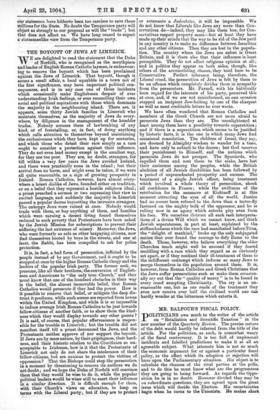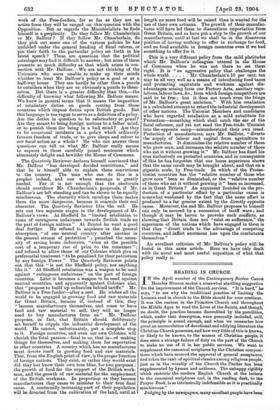work of the Free-fooders, for so far as they are
an active force they will be ranged on this'question with the Opposition. But as regards the Ministerialists he finds himself in a perplexity. Do they follow Mr. Chamberlain or Mr. Balfour ? If they follow Mr. Chamberlain, do they pick out some one of the various policies he has unfolded under the general heading of fiscal reform, or pin their faith to the particular policy set forth in his latest speech ? These are questions that the political astrologer may find it difficult to answer ; but none of them presents so much difficulty as that which arises in con- nection with Mr. Balfour. We are not thinking of the Unionists who seem unable to make up their minds whether to treat Mr. Balfour's policy as a goal or as a half-way house. They can hardly be other than a puzzle to outsiders when they are so obviously a puzzle to them- selves. But there is a greater difficulty than this,—the difficulty of knowing what following Mr. Balfour means. We know in general terms that it means the imposition of retaliatory duties on goods coming from those countries which impose duties upon British goods. But this language is too vague to serve as a definition of a policy. Are the duties in question to be reformatory or penal ? Are they meant to bring foreign nations to a better mind, or to punish them for being in a bad mind ? Are they to he occasional incidents in a policy which ordinarily favours freedom of trade, or to give shape and colour to our fiscal action as a whole ? He who can answer these questions can tell us what Mr. Balfour really means to express in those carefully poised sentences which alternately delight and bewilder the House of Commons.
The Quarterly Reviewer declares himself convinced that Mr. Balfour "has developed decided convictions," and that he is himself able to explain these convictions to the country. The man who can do this is a prophet indeed, and one whose message is greatly needed. For it is not enough that the electorate should overthrow Mr. Chamberlain's proposals, if Mr. Balfour's are left standing and can be shown to be equally mischievous. The obscurity which envelops them makes them the more dangerous, because it conceals their real character. The Quarterly Reviewer lifts the veil. He sets out two separate stages in the development of Mr. Balfour's views. At Sheffield he " limited retaliation to cases of outrageous unfairness towards British trade on the part of foreign nations." At Bristol he wont a good deal further. He refused to acquiesce in the general absorption " of one neutral country after another in the general stream of protection" ; preached the neces- sity of saving home industries, "even at the possible cost of a temporary rise of price to the consumer " ; and refused to allow those of our Colonies which give us preferential treatment "to be penalised for their patriotism by any foreign Power." The Quarterly Reviewer points out that this " is not the Sheffield policy, nor anything like it." At Sheffield retaliation was a weapon to be used against " outrageous unfairness " on the part of foreign countries. Later it becomes a weapon to be used against neutral countries, and apparently against Colonies also, that " propose to build up industries behind tariffs." Mr. Balfour is a Free-fooder—after a sort. He wishes all the world to be engaged in growing food and raw materials for Great Britain, because if, instead of this, they "become manufacturers themselves, and cease to have food and raw material to sell, they will no longer need to buy manufactures from us." Mr. Balfour proposes, in fact, that Britain should deliberately set herself to cripple the industrial development of the world. He cannot, unfortunately, put a complete stop to it. Foreign countries, and even our own Colonies, will cherish the fatal passion—fatal to us, that is—of making things for themselves, and making them for exportation to other countries. A country which has no manufactures must devote itself to growing food and raw materials. That, from the English point of view, is the proper function of foreign nations. They exist, or rather they would exist did they but know their own true bliss, for two purposes ; the growth of food for the support of the British work- man, and the growth of raw material for the employment of the British workman. In proportion as they become manufacturers they cease to minister to their true final cause. A continually increasing part of their population will be diverted froin the cultivation of the land, until.at This is a very different policy from the mild platitudes which Mr. Balfour's colleagues uttered in the House of Commons when he was not there to set them right. It is " an aggressive policy that challenges the whole world. . . . . Mr. Chamberlain's 10 per cent. tax may be all very well as a means of introducing food taxes and protecting capitalists and workmen against dis- advantages arising from our Factory Acts, sanitary regu- lations, labour laws, &c., from which foreign competitors are said to be free ; but it does not touch even the fringe of Mr. Balfour's great ambition." With him retaliation is a calculated attempt to retard the industrial development of other nations. The Unionist Members and candidates who have regarded retaliation as a mild substitute. for Protection—something which shall catch the ear of the fiscal reformer, and yet not send the Free-trade Unionist into the opposite camp—misunderstand their own creed. Protection of manufactures, says Mr. Balfour, "diverts the supply of labour and capital from agriculture to manufactures. It diminishes the relative number of those who grow corn, and increases the relative number of those who eat it without growing it." Mr. Balfour has fixed his eyes exclusively on protected countries, and in consequence of this he has forgotten that our home experience shows that the same result may be brought about, and that on a gigantic scale, by Free-trade. In which of the Protec- tionist countries has the "relative number of those who grow corn" been so diminished, or the "relative number of those who eat it without growing it" been so increased, as in Great Britain ? An argument founded on the pro- duction of a particular effect by a particular cause is somewhat weakened by the fact that the same effect is produced to a far greater extent by the directly opposite cause. Moreover, the end Mr. Balfour proposes to himself can only be secured by a succession of tariff ware ; and though it may be heroic to provoke such conflicts, as showing that Britain does not "exist on sufferance," the experience of the nations which have engaged in them is that they " divert trade to the advantage of competing countries, and inflict enormous lose upon the combatants themselves."
An excellent criticism of Mr. Balfour's policy will be found in this same article. Here we have only dealt with its novel and most useful exposition of what that policy really is.
READING IN CHURCH.
IN the April number of the Contemporary Bevies) Canon Hensley Henson makes a somewhat startling suggesition for the improvement of the Church services. "It is hard," he says, "to see why the traditional practice of limiting the Lessons read in church to the Bible should for ever continue. It was the custom in the Primitive Church and throughout the Middle Ages to read the Lives of the Saints, and though, no doubt, the practice became discredited by the pnerilities, which, under that description, were generally included, still, the principle is sound enough, and when we remember how great an accumulation of devotional and edifying literature the Christian Church possesses, and how very little of this is known, or likely to be known, to the masses of Christian people, it does seem a strange failure of duty on the part of the Church to make no use of it in her public services. We want to supplement the canonical scriptures by the Christian composi- tions which have secured the approval of general acceptance, and taken the rank of spiritual classics among religions people, just as in the worship of the Church the Psalter has been supplemented by hymns and anthems. The unhappy rigidity which restricts the modern English • Church at the lectern to the canonical scriptures and, in the reading desk, to the Prayer Book, is as intrinsically indefensible as it is practically miachievous." • Judging 14 the newspape* many excellent People liavObeen;











































 Previous page
Previous page